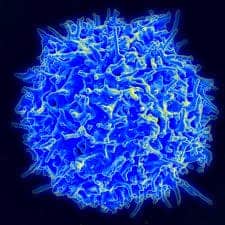People suffering from lupus are typically required to take medicine throughout their lives. However, a new CAR-T cell therapy called obecabtagene autoleucel could change this situation.
CAR-T therapy (Chimeric Antigen Receptor T-cell therapy) is an advanced treatment typically used for cancer. A patient’s T-cells are genetically modified to express a receptor that specifically targets cancer cells. Once reinfused into the patient, these engineered T-cells can recognize and destroy cancer cells more effectively. Recently, this technique is being trialed for other conditions. Now, three patients in the UK have received this treatment, and are no longer dependent on lupus drugs.

Lupus is a poorly understood condition. It develops when an individual’s immune system begins damaging their own body cells. It is a chronic auto-immune disease affecting 1.5 million lives in the US alone. Globally, around five million people suffer from this painful and deadly disease, and the real figure could be much greater. There is no permanent cure for lupus as of now. Or rather, there wasn’t.
“Lupus is a disease that requires lifelong medication, but this therapy has the potential to change that, which is incredibly exciting. This groundbreaking new therapy marks a significant milestone in our research into lupus,” Dr. Ben Parker, a rheumatologist at Manchester University NHS Foundation Trust, told The Guardian.
What makes the results more exciting is that the three patients were suffering from the most life-threatening form of lupus, yet the treatment worked well.
The science of treating lupus without drugs
Obecabtagene autoleucel is a novel type of CAR T-cell therapy that is specially designed to target a protein called CD19. This protein is found on the surface of B cells (cells that produce antibodies), with lupus or cancer. The therapy involves a step-by-step procedure.
First, doctors extract a sample of the patient’s own T-cells (immune cells that defend the body against infections) from their blood. In the next step, they modify the T-cells by adding CAR (chimeric antigen receptor) to them. This receptor has the ability to detect the CD19 protein.
The modified T-cells are then multiplied in the lab. Once they reach a stage where they are enough in number to fight effectively, the genetically engineered T-cells are again infused into the patient’s body where they begin identifying and killing all the B-cells with CD19 protein —- helping the body deal with lupus without taking any drugs.
The treatment was recently tested on three patients including a 50-year-old patient named Katie Tinkler, who has been suffering from lupus for the last 30 years.
She had the worst form of this auto-immune disease which caused her to experience severe joint pain and kidney problems. However, along with the two patients, she’s in remission now and has stopped taking her lupus medication.
“If this works, it’s life-changing. Until now, there’s never been anything for lupus that is a possible cure. The dream is to be lupus-free — that would be phenomenal,” Tinker said.
A 15-year follow-up
The three patients are currently admitted to a hospital, where doctors will monitor their health for the next 10 days. The stay will allow the immune system of the lupus patients to recover and adjust to the new T-cell therapy. Plus, it might also shed light on any potential side effects of the treatment.
However, obecabtagene autoleucel is still a new treatment. It has been less than a year since it was approved in the UK and just last week on November 8, the US Food and Drug Administration gave it the green light. Therefore, it is still not well known how this CAR-T therapy affects the human body.
In order to fully understand the results of the treatment, the doctors have decided to follow up on the three patients for the next 15 years. Hopefully, their disease will never relapse, and they will continue to live a healthy life —- showing millions of lupus patients a path to live without relying on medicines.
“It is an incredibly exciting time to now offer this mode of treatment to lupus patients through this clinical trial. We hope the treatment will provide positive outcomes and revolutionize treatment options for patients with the disease,” Dr. Eleni Tholouli, a consultant hematologist at the Manchester University NHS Foundation Trust, said.





